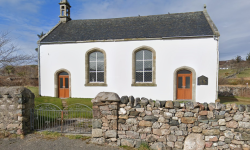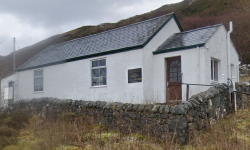CHAPTER 1. ISLAND OF ST. KILDA.
AT the time when, after the Revolution Settlement, very many persons of influence in Scotland were planning and plotting by all possible means to restore Popery, and to subject our land again to the sway of that soul-destroying system, there was a godly lady, Lady Grange, born in the county of Fife, but married in Edinburgh, who discovered that her own husband and several noblemen and gentlemen had been laying plans for the accomplishment of the said object. She loved her husband dearly, and used all means to prevail on him to abandon his purpose; but as neither prayers nor entreaties nor earnest reasonings and counsel availed, and as she loved Bible truth with its soul-saving doctrines, the blessed Redeemer’s cause, and the salvation of her native country from ruin, better than she did her husband-much as she was attached to him-she told him plainly that she would reveal all she knew of the designs in which he was so deeply implicated. When this man found that his noble Christian lady could not be prevented from executing her purpose, he had her conveyed away privately to the residence of one of his friends in the island of Harris, one of the wildest islands in the Hebrides.
This good lady’s persecution did not cease even then. There is an island off the coast of Harris, very far out in the ocean, named St. Kilda, but originally called Hirt. The name is much more familiar now than it was when this sketch was written. In the days in which highland and island as well as lowland barons held the power of life and death over their dependents, this island was used as a place of banishment-in the same way as was the island of Patmos, in the Ægean Sea, by the Roman emperors. And certainly no ocean prison could have been more dreary. Fancy to yourselves a lady, brought up in affluence, accustomed to all the social advantages of elegant society, and, above all, endowed with qualities of both mind and heart which led her to seek enjoyment in the fellowship of all who truly feared the Lord; fancy, I say, such a lady forced into a boat or chieftain’s barge, and after a fatiguing voyage, without any protection from the weather, approaching at last this sea-girt islet. She sees lofty, precipitous rocks all round down to the water’s edge—nothing like a landing-place anywhere. The sea in all its might, even on an ordinarily calm day, roils a regular surf towards those rocky shores, and when it dashes against the opposing wall of rock, rises in masses of foam and spray fully thirty feet up against the solid bulwark. At last something like a landing-place is seen in one solitary spot. But will not the attempt to land he unsuccessful? See the force with which the ocean wave rolls in; observe the violence with which it again recedes, as if disappointed and angry at not having torn up the whole rock in one fell swoop. It would seem to gather itself up into its own bosom, in order, with one final effort, to overturn the island in the very next encounter!
Who, then, are those people who stand at the head of the creek? They are a body of forty men, stalwart and strong, swarthly and dark-complexioned. Their dress, and indeed their whole appearance, speaks loudly of uncouthness. What is their object? Is it hostile, or is it friendly? Friendly or hostile, what matters that to this lady, who sees in these rough-looking characters, in their wives and in their children, now congregated at the upper end of the beach, the companions of her future years of solitude! When she remembers her old and devoted attendants at home-now no home of hers; when she connects her former dear friends and near relatives with those among whom her lot is now cast; when these unkempt and almost naked little ones bring up to her recollection her own dear ones, whom she shall never be allowed again to seeis not her overwhelmed soul like to break through the tenement of clay? Is not the heart ready to burst? Burst certainly it would, had it not been that the glorious Master whom she loved, and for her fidelity to whom she was now suffering, kept His gracious hands about her. The Lord sustained her, for He had purposes to accomplish which she knew not. What now? There is the boat approaching the shore, reeling on the top of a swelling wave! The men on shore meet it before it can touch the strand; they grasp it firmly, to prevent it being drawn outwards with the recess of the wave; they plant themselves under its sides, and lift it and its crew and all contained in it, to convey it up, high and dry, beyond the reach of the waves.
Lady Grange is now landed within the walls of that islet which is to be her prison-house. When Alexander Selkirk was left on the island of Juan Fernandez, he had an iron pot and some few necessaries landed along with him. He could build a hut for himself; there were spontaneous productions on the island of which he could avail himself. In Lady Grange’s case matters were different. Even if her hard-hearted lord had ordered some scanty supplies to be sent-and it is likely he did-they could be conveyed only once in the year. There was no house provided for her;’ she must huddle into one of the half-underground huts of the St. Kildians, and must roll herself up at night in one of the beds found in the walls of such a place. These huts had only one apartment, with a number of other such beds ranged all round the walls. The fire was in the middle of the floor, and the smoke, not finding any proper outlet, often enveloped all the inmates in one dense suffocating cloud. The ashes were spread morning after morning along the floor, and trampled down firmly; while the cattle and sheep might be seen lying all night in the other end of the hut. No part of it was ever attempted to be cleaned till the approach of spring induced the inhabitants to clear out the accumulations of the whole year for purposes of tillage-and this was to get some little crop raised on the barren plots of ground among the rocks.
Young people, you will now be disposed to think with gratitude of the care bestowed on yourselves from your infancy? Surely you will be more apt to listen to Him who says to you, with regard you to all your your privileges, “Improve till I come!”
Let me ask you whether your pride and discontent would not in a case have rebelled against the Divine appointment? whether you would not have said, “It is good to be angry?” or whether, when you got up out of such a bed, or when you got a meal of birds ill-cooked, or a dish of sea-bird’s eggs ill-dressed, you would look up to the Lord and implore the grace of contentment? And then, though there are no trees there to shade you, would you have gone out in quest of some solitary nook among the rocks, to pour out your heart to the Lord, imploring grace to enable you to conduct yourself, among such people, in a way that would redound to His glory, and conduce to the well-being of the uncultivated race around you?
With regard to this lady, the Lord, who gives no account of His matters, saw meet that it must be in such a place as St. Kilda then was-a place uncivilised in the extreme, afar from the public and outward means of grace-that she was to have the process of sanctification carried on to the end. The lover was a strange one; but through the Word of God, through faith and prayer, the object was accomplished. After a lapse of many years her sufferings were brought to a close, and her remairJs lie in the western side of the island of Skye, in the blessed hope of a glorious resurrection.
In the midst of all, Lady Grange was not always without rays of consolation. We cannot tell what were the direct fruits of her interest in the people after she had begun to learn a little of their language. No doubt her example and conversation were blessed, though we have no record or means of ascertaining to what extent. But the Lord sent her one special help, and thereby also wrought for His own glory.
Her husband had concocted such a tissue of falsehoods in his own defence, covering his lady’s name with obloquy, that no effective steps were taken for her deliverance. But her minister in the lowlands having, in an unlooked-for manner, found out the place of her banishment, was able to pay her an annual visit. He managed also to acquire so much knowledge of the language of people of the northern counties through which he passed, as to be able to preach to them the Word of Life. His journey led him through the island of Skye, and it was there, on occasion of one of the last of these visits, that Mary Bethune was blessed.1
1It was in 1730 that Lady Grange was carried away from her house in Edinburgh and conveyed secretly first to Heiskar, nine miles from North Uist, and thereafter to St. Kilda. She lived seven years there, her only companion being a little girl who waited on her; but, on occasion of an attempt to rescue her from her exile, she was conveyed to Skye. In all likelihood it was on her removal to that island that her old minister found her out, and began to give her an annual visit. She was about ten years there, and died in 1749.

